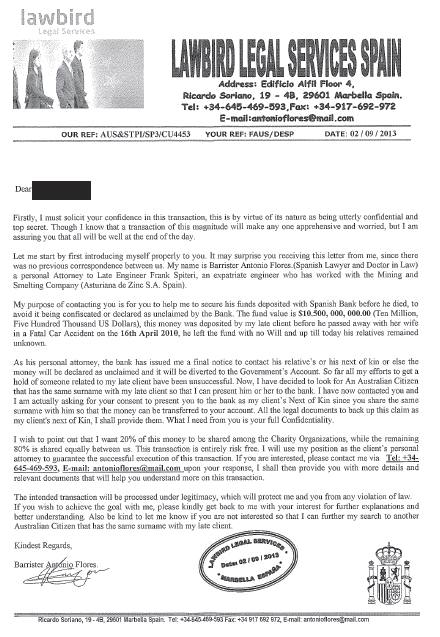Spain’s Real Estate Residency Finally Approved
 With effect from the 29-09-2013, the Spanish Government has approvedthe Investors’ Support and Internationalization 14/2013 Act which includes, among others measures, a Spanish residency programme that will allow investors to become permanent investors if they invest, at least, €500,000 in a property. The law was published early this morning in the Spanish Official Gazzete (BOE) and one of the most crucial aspect of it is that it facilitates people traveling to, or residing in Spain, who intend to carry out a ‘relevant investment’.
With effect from the 29-09-2013, the Spanish Government has approvedthe Investors’ Support and Internationalization 14/2013 Act which includes, among others measures, a Spanish residency programme that will allow investors to become permanent investors if they invest, at least, €500,000 in a property. The law was published early this morning in the Spanish Official Gazzete (BOE) and one of the most crucial aspect of it is that it facilitates people traveling to, or residing in Spain, who intend to carry out a ‘relevant investment’.
What is a relevant investment?
According to article, 63, the following will suffice to attain residency in Spain:
- An investment of at least €2,000,000 in Spanish Government bonds.
- An investment of at least €1,000,000 in shares of Spanish companies.
- An investment of at least €1,000,000 with a Spanish-based bank or financial entity (basically, depositing that money in a savings or fixed deposit account).
- An investment of at least €500,000 in Spanish property (one or more), per applicant, provided the first €500,000 of the property value is unencumbered (mortgage free).
- A business investment that is to be carried out in Spain and is deemed of public interest for which purpose, at least one of the following conditions will be considered relevant: a) jobs it will create b) socioeconomic impact in the geographical area where the activity is to be carried out and c) relevant contribution to technological or scientific innovation.
Investment by foreign companies also qualify for residency provided it does not originate from an offshore tax haven, as per Spanish laws, and that the investor owns, directly or indirectly, the majority of its voting rights and has also the right to designate or remove the majority of the members of the board of directors.
Investment Residency Visa and Investment Residency Permit
The Act has created 2 different types of documents to enter and reside in Spain, the Residency Visa and the Residency Permit. The Residency Visa is valid for up to 1 year, and the Residency Permit is valid for up to 2 years, which can be extended for a further 2 years. This would give a total of 5 years, 4 of which are deemed proper residency and the first one, just the right to stay and live (an important distinction because 5 years of continued residency entitles the beneficiary to reside permanently in Spain). In addition to meeting the conditions to qualify for the Investors’ Residency Visa, an applicant for an Investors’ Residency Permitwill have to comply with the following:
- Hold an Investors’ Residency Visa that is not overdue by more than 90 days over the expiration date.
- Have travelled to Spain at least once during the validity of the Visa.
- Prove that the investment that enabled the applicant to receive the Visa is still in place.
What other requirements have to be met?
The Act will also require that any applicant complies with the following (standard in the Non-Lucrative or Non-Working Residency Permit):
- Not be in Spain irregularly.
- Be over 18 years of age.
- Absence of a criminal record in the country of original residency.
- Have medical insurance.
- Have sufficient money or financial means to support the applicant (and family) during the period of stay in Spain: if we are guided by the prerequisites of the Non-Lucrative Residency Permit, the applicant will need to prove earning of at least €2,128/month, plus an additional €532/month per family member.
Application Process and Timescales
The Residency Visa will be applied for and granted by the Spanish Consulate of the demarcation of the applicant. The Residency Authorization will be applied for and granted by Directorate General of Migrations. An application for a Residency Visa will be resolved in a maximum period of 10 days, except where the application is subject to the EU Visa Code. The Residency Authorization will be granted in a maximum period of 20 days from application after which period, if the Consulate has not responded, the application will be presumed granted.
How would it work, in practical terms?
An applicant that wishes to apply for a Residency Visa under the Act will first need to apply for an ordinary visa, with a view to travel to Spain and investigate investment options/opportunities, meet with lawyers, real estate agents, banks, etc. Once a decision is made and the investment carried out, the Residency Visa will have to be applied for at the Consulate. Obviously, it is possible that an investor decides to proceed with the investment operations remotely (for instance, purchasing a property via a lawyer, with a Power of Attorney) and, on conclusion of the property conveyance transaction, he applies for a Residency Visa with the required proof of his investment i.e. Property Title Deeds. The Act does stipulate that the investment needs to be maintained during the period of the validity of the Residency Visa or Residency Permit, and that routine checks may be carried out to verify if this is the case.
Do I have to be in Spain for more than 6 months during any year period?
Specifically, NO! The Act stipulates that Residency Visa or Residency Permit holders do not need to spend more than 6 months in Spain, with a view to renew the permit (which implies that, as stipulated in the law, provided they are in Spain at least once during the period of the Residency Visa, they are pretty much free to spend their time as they wish, in Spain or in any other country).
Can I become a Permanent Resident in Spain or a Spanish Citizen through this method?
YES. In fact, the Act specifically states that the applicant’s absences will not prejudice the right to permanent residency (5 years onwards) and citizenship.
Can a person still apply for permanent residency without having to invest the sums in this law i.e. buying a property worth say €200,000, with a €180,000 mortgage?
The Act has not modified the 2 other main types of residency permit applications, which are:
- Non-Lucrative Residency Permit (Autorización de Residencia No-Lucrativa)
- Self-Employed Work and Residency Permit (Autorizacion de Residencia y Trabajo Por Cuenta Propia)
This means a person can still apply for residency in Spain via the regular -above- procedures.
Can I apply if I already have a (unencumbered) property in Spain worth €500,000?
The Act does not include investors who already had a property in Spain prior to its enactment although, nothing stops them from selling, buying again and then apply for the Investors Residency Visa and further, the Investors Residency Permit. People that comply with the other financial criteria (having cash deposits, shares etc.) can apply.


 Great day yesterday in the office with James Scurrah, from
Great day yesterday in the office with James Scurrah, from 
